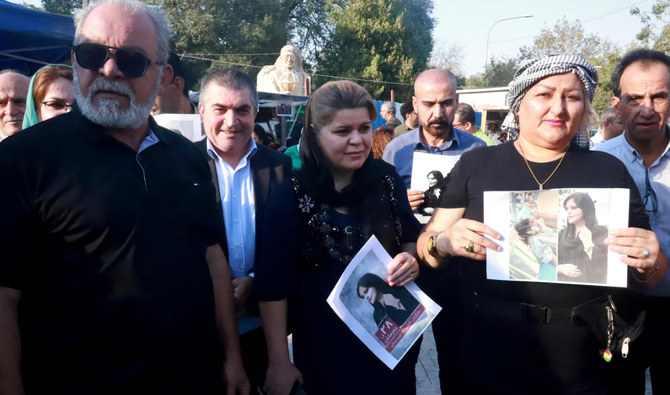TEHRAN: The Iranian human rights group Hengaw said two men were killed on Monday in protests against the death of a Kurdish woman after her arrest by Iran’s morality police, but there was no immediate official confirmation of the report.
“In Monday’s protests in the town of Divandarreh, at least two citizens — Fouad Qadimi and Mohsen Mohammadi — died after being taken to Kosar Hospital in Sanandaj and 15 others were injured,” Hengaw said on its Twitter account.
A spokesperson for the White House National Security Council said the US wants accountability for her death.
“Mahsa Amini’s death after injuries sustained while in police custody for wearing an ‘improper’ hijab is an appalling and egregious affront to human rights,” the official said. “Our thoughts are with Mahsa’s family and loved ones.”
“Women in Iran should have the right to wear what they want, free from violence or harassment. Iran must end its use of violence against women for exercising their fundamental freedoms,” the official said. “There must be accountability for Mahsa’s death.”
Demonstrations were held in the capital Tehran, including several of its universities, as well in Iran’s second city, Mashhad, according to the Fars and Tasnim news agencies.
Protesters marched down Hijab Street — or “headscarf street” — in the center of Tehran denouncing the actions of the morality police, the ISNA news agency reported.
“Several hundred people chanted slogans against the authorities, some of them took off their hijab,” Fars said, adding that “police arrested several people and dispersed the crowd using batons and tear gas.”
A brief video released by Fars shows a crowd of several dozen people, including women who have removed their headscarves, shouting “Death to the Islamic republic!”
A “similar gathering” took place in the northeastern city Mashhad, the Tasnim agency reported.
The rallies on Monday came a day after police made arrests and fired tear gas in the dead woman’s home province of Kurdistan, where some 500 people had protested, some smashing car windows and torching rubbish bins, reports said.
Public anger has grown since authorities on Friday announced the death of Mahsa Amini, 22, in a hospital after three days in a coma, following her arrest by Tehran’s morality police during a visit to the capital on September 13.
Such police units enforce a dress code in the Islamic republic that demands women wear headscarves in public.
It also bans tight trousers, ripped jeans, clothes that expose the knees and brightly colored outfits.
Police have insisted there was “no physical contact” between officers and the victim.
Tehran police chief General Hossein Rahimi said Monday the woman had violated the dress code, and that his colleagues had asked her relatives to bring her “decent clothes.”
He again rejected “unjust accusations against the police” and said “the evidence shows that there was no negligence or inappropriate behavior on the part of the police.”
“This is an unfortunate incident and we wish never to see such incidents again.”
Students rallied, however, including at Tehran and Shahid Beheshti universities, demanding “clarification” on how Amini died, according to Fars and Tasnim news agencies.
Her death has reignited calls to rein in morality police actions against women suspected of violating the dress code, in effect since the 1979 Islamic revolution.
Filmmakers, artists, athletes and political and religious figures have taken to social media to express their anger over the death, both inside and outside the country.
President Ebrahim Raisi, an ultra-conservative former judiciary chief who came to power last year, has ordered an inquiry into Amini’s death.
State television on Friday broadcast a short surveillance video that showed a woman identified as Amini collapsing in the police station after an argument with a policewoman.
Amjad Amini, the victim’s father, told Fars that he did “not accept what (the police) showed him,” arguing that “the film has been cut.”




























